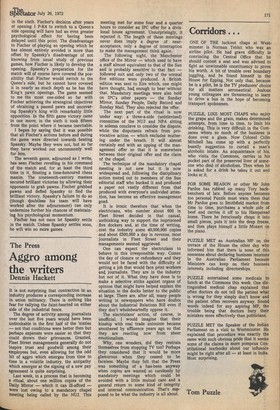The Press
Aggro among
the writers
Dennis Hackett
It is not surprising that contraction in an industry produces a corresponding increase in union militancy. There is nothing like fear for rallying the faint-hearted on either side of the industrial fence.
The degree of activity among journalists over the last five years would have been unthinkable in the first half of the 'sixties — not that conditions were better then but perhaps expenses were easier so that they could drown their grievances. Granted, Fleet Street managements generally do not inspire trust and goodwill among their employees but, even allowing for the odd bit of aggro which emerges from time to time in a volatile industry, the antipathy Which emerges at the signing of a new pay agreement is quite surprising.
Last week, in a process that is becoming a ritual, about one million copies of the Daily Mirror — which it can ill-afford — were lost owing to a mandatory chapel meeting being called by the NUJ. This meeting met for some four and a quarter hours to consider an IPC offer for a divis ional house agreement. Unsurprisingly, it rejected it. The length of these meetings never does imply a degree of nearacceptance, only a degree of interruption to make the management think again.
The following night, the Manchester office of the Mirror — which used to have a staff almost equivalent to that of the Sun and is probably sensitive to that fact — followed suit and only two of the normal five editions were produced. A British edition was sent to Eire which, one might have thought, had enough to bear without that. Mandatory meetings were also held on IPC's other papers — the Sunday Mirror, Sunday People, Daily Record and Sunday Mail. They also rejected the offer.
The next part of the ritual is now under way: a three-a-side (untelevised) committee •of the NUJ and NPA sitting in solemn conclave to consider the dispute, while the disputants refrain from provocative action — which excludes muttering under the breath. It will almost certainly end with an upping of the management offer so that it is somewhere between their original offer and the claim of the chapel.
The technique of the mandatory chapel meeting is not new but it is now widespread and, following the disciplinary action meted out to members of the Sun editorial staff who bucked it and produced a paper not vastly different from that produced with everyone's undivided attention, has become an effective management goad.
It is ironic therefore that when the electricians, who number about 600 in Fleet Street decided in that casual, unthinking way to support the imprisoned five dockers and, at the time of writing, cost the industry some 40,000,000 copies and about £500,000 a day in revenue, most journalists in Fleet Street and their managements seemed aggrieved.
One can expect the electricians to behave in this irresponsible way. Comes the day of closure or redundancy and they would not be faced with the difficulty of getting a job that would face print workers and journalists. They are in the industry but not of it. What they have done is to make a selective strike against organs of opinion that might have helped explain the situation in the docks better to the public at large. There are, after all, many people writing in newspapers who have doubts about the Industrial Relations Bill even if they don't wholeheartedly oppose it.
The electricians' action, of course, is unofficial. I would imagine that their kinship with real trade unionism became smothered by affluence years ago so that they are reacting now from sheer emotionalism.
Why, one wonders, did they restrain themselves from stopping TV too? Perhaps they considered that it would be more glamorous when they ceased to be faceless. Maybe they felt that the Press was something of a has-been anyway when copies are wasted so carelessly by mandatory meetings which could be avoided with a little mutual care and a general return to some kind of integrity and internal communication. That's supposed to be what the industry is all about.








































 Previous page
Previous page